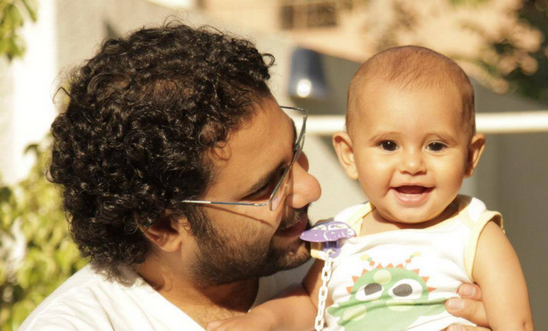
Our local group position and resources on Alaa Abd El Fattah

As a local group, we are monitoring the case of British-Egyptian prisoner of conscience, Alaa Abd El Fattah. In this blog post, we contextualise the circumstances of his case and summarise why his release should be treated as the urgent recognition of his human rights.
Amnesty International and Prisoners of Conscience
As a local group, we are especially monitoring the case of British-Egyptian political prisoner, Alaa Abd El Fattah. We take this interest in the tradition of Amnesty International founder, British lawyer Peter Beneson. Beneson coined the term ‘prisoner of conscience’, and in founding Amnesty International placed a strong campaign emphasis on the rights of prisoners of conscience. According to AIUK, a prisoner of conscience is defined thus:
“Amnesty International defines a prisoner of conscience as a person imprisoned (or otherwise detained) solely because of who they are (ethnic origin, sex, colour, language, national or social origin, economic status, birth, sexual orientation, gender identity or expression, or other status) or what they believe (political, religious or other conscientiously held beliefs), who has not used violence or advocated violence or hatred in the circumstances leading to their detention. Amnesty calls for the immediate and unconditional release of all PoCs.”
Alaa Abd El Fattah in the context of Egyptian human rights violations
Alaa Abd el-Fattah is an activist, blogger, writer and thinker who is symbolically associated with the 2011 Egyptian revolution. This was a democratic and human rights-based revolution in opposition to the 30-year rule of Hosni Mubarak. Sparked by the January 2011 Tunisian revolt against President Zine El Abidine Ben Ali, Egyptians were emboldened to call for the “downfall of the regime” in a stand against repression, poverty, inequality, corruption, police brutality and lacking civil/political rights (see Amnesty Report on ‘State of Rights in The Middle East and North Africa, January to mid-April 2011). For 17 months after the resignation of Mubarak, the Supreme Council of Armed Forces (SCAF) controlled Egypt, killing over 120 protestors over the course of their rule. In June 2012, Mohamed Morsi was elected as president, but in July 2013 he was overthrown by army chief Abdel Fattah el-Sisi. Sisi then restored military rule to Egypt.
Alaa Abd El Fattah’s current imprisonment
Alaa has been imprisoned by the Mubarak regime, the Supreme Council of Armed Forces and then after the coup by Sisi. Whilst imprisoned Alaa missed the birth of his son, and has experienced multiple human rights violations such as ‘arbitrary detention, unfair trial, torture..and periodic bans on family visits’.
His current imprisonment follows an illegitimate detention for ‘spreading false news’ on the 29th September 2019. According to The Big Picture Podcast, this was for ‘sharing a Facebook post about the death of a prison inmate’. This detention has been judged as illegal by a UN panel. He was issued a five-year sentence on 20th December 2021, which was completed on the 29th September 2024. However, Egyptian authorities do not acknowledge the time he spent in detention as time served.
During his time in prison, Alaa has had life threatening experiences through hunger strikes. Multiple international campaigns exist for Alaa, including Access Now, Amnesty International, Committee to Protect Journalists, Electronic Frontier Foundation and PEN America. Additionally, his mother is supported by Mathematicians for Laila Soueif.
Laila Soueif’s current hunger strike
Alaa’s 69 year old mother, Laila Soueif, has been on hunger strike since the Egyptian authority’s failure to release her son on the completion of this sentence in September. Alaa’s release, particularly given the risk to his mother’s health, has been called for my multiple organisations, for example in a joint letter in February 2025 to David Lammy from Amnesty International and 24 other human rights focused organisations. In February 2025, The Times reported Keir Starmer advocating for Alaa’s ‘release in a call to President Sisi’.
British-born, mathematician Laila Soueif remains in a critical condition. Some of her last media interactions were around 3rd June, 2025. According to The Big Picture Podcast, during the time of her hunger strike, Souief ‘has lost over 40% of her body weight’. She told The Guardian newspaper, “My message is: use my death as leverage to get Alaa out. Don’t let my death be in vain.”
In March 2025, Al-Monitor reported Alaa beginning ‘another hunger strike…in solidarity with his mother.’ On July 22nd2025, Al-Monitor reported Egypt’s removal of Alaa Abdel-Fattah from the terror list, however he remains in prison, and his mother, Laila Souief, remains in critical condition.
by Bella (co-secretary, B12, B13, B14)
References
https://www.amnesty.org.uk/egypt-after-2011-revolution
https://www.amnesty.org/en/what-we-do/detention/
https://www.amnesty.org/en/documents/pol10/012/2011/en/
https://www.amnesty.org/en/documents/mde12/8567/2024/en/
https://www.amnesty.org/en/documents/mde12/9060/2025/en/
https://www.youtube.com/watch?v=6o1eC50rITE
https://www.al-monitor.com/originals/2025/07/what-make-egypts-removal-alaa-abdel-fattah-terror-list
image taken from: https://www.amnesty.org.uk/Alaa-Abdel-Fattah-Whats-Happening
0 comments